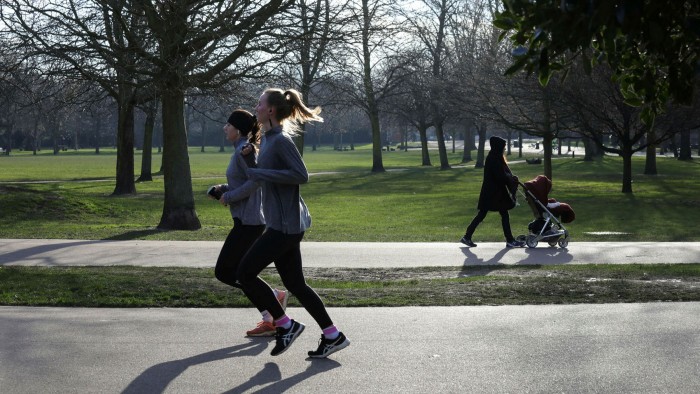Covid provides fresh impetus to tackle global obesity

Roula Khalaf, Editor of the FT, selects her favourite stories in this weekly newsletter.
The UK prime minister issued an unsweetened self-diagnosis after he was admitted to intensive care with Covid-19 last year. “I had a very common underlying condition,” he said in a speech. “I was too fat.”
Boris Johnson’s battle with the virus hastened national measures to limit the marketing of unhealthy foods, by restricting their placement in supermarkets and online advertising.
But, while obesity significantly increases the risk of severe illness from Covid-19, heightened global awareness of such “lifestyle” conditions has failed to translate into broad-based action, says Corinna Hawkes, professor of food policy at City, University of London.
“There was a lot of hope at the beginning, but in my extensive international engagement, that conversation seems to have passed,” she says — adding that new variants of the virus have shifted the focus away from obesity.

That is a missed opportunity, reckons Hawkes. “What we eat is profoundly important from a morbidity perspective,” she says.
Being in the obese and overweight categories are major risk factors not just for severe Covid-19, but for a range of non-communicable diseases from cardiovascular conditions to cancers; they also increase infection risk.
In 2017, high body mass index cost 4.7m lives and 148m disability-adjusted life years across the world. The pandemic is thought to have worsened this obesity crisis by having a negative effect on people’s diets and exercise levels.
“Lots of my patients have put on weight . . . people are not commuting, and lots of them have told me that they are sitting at home, they get bored and they go to the fridge and there is lots of food — we all tend to do that,” says Naveed Sattar, professor of metabolic medicine at the University of Glasgow.

Governments were already aware that they needed to address obesity, the global prevalence of which has nearly tripled since 1975.
One successful UK intervention has been copied in many countries: a tax on high-sugar soft drinks, introduced in 2018, pushed manufacturers to reduce sugar in their beverages, cutting 6,500 calories from the average UK resident’s annual intake.
Elsewhere, in Chile, strict marketing rules for foods and drinks high in energy, sugar, sodium and saturated fats — including banning sales in schools and requiring warning labels on packaging — have achieved measurable effects, reducing the purchase of sugary drinks.
However, more action is needed. “We are not really seeing declining obesity rates anywhere yet,” says Hawkes.

Graham MacGregor, chair of Action on Sugar and professor of cardiovascular medicine at the Wolfson Institute of Preventive Medicine, says reduction targets should be agreed with the food industry and closely monitored. These should be similar to the UK’s salt reduction targets in the in the early 2000s, which helped reduce heart disease and hypertension, he adds.
Such gradual reformulation, backed by threat of legislation, can enable the population’s taste buds to adapt. Yet subsequent targets for salt and sugar have not been so closely monitored, leading to a lack of progress, notes MacGregor.
“The food industry bears a lot of responsibility for obesity,” he says. “They need to become much more responsible. It’s perfectly possible to make healthy snacks if they want to,” he says.
More stories from this report
Covid raises bar for infectious disease crisis response
HIV treatments advance but vaccine remains ‘a long way off’
Covid spurs expansion of public healthcare
Governments fall behind in race to stem antimicrobial resistance
Covid mission a shot in the arm for vaccine industry
Long Covid researchers work ‘round the clock’ to solve the puzzle
In Johnson’s government, those with libertarian leanings have balked at what they see as “nanny state” measures such as imposing fresh requirements on food manufacturers.
Amy Glass, UK diet and health policy manager at the Food and Drink Federation, calls for a “holistic strategy” including support for local communities.
“Government policies to date have focused on what we should reduce from the diet, like calories, sugars and salt, but we’d also like to see more focus on what we should try to eat more of, such as fruits, vegetables and fibre, which is equally important,” says Glass.
However, some argue interventions are needed on a grander scale to achieve real change. Hawkes advocates plain packaging on unhealthy food to eliminate the effects of seductive branding.
Fostering healthier lifestyles also requires different urban design, she says, “[so that streets] are amenable to children to get out on their bikes, to walk, to be out in green space”.
Sattar says governments and companies should “think seriously about a four-day working week so people have an extra day a week for activity and sport”. He also cites the role of inequality, with those in poverty in developed countries at greater risk of excess weight than their wealthier compatriots.
Addressing obesity cuts into so many global issues that a Lancet commission on the topic, which reported in 2019, changed its own remit to “the global syndemic [ie multiple epidemics] of obesity, undernutrition and climate change”. That means answers will be far from simple.
But for Sattar, obesity is “the biggest game in town” in terms of research and action. “It’s driving multiple problems with mobility, ill-health and unhappiness. And it’s driving it much worse in all the parts of society least able to cope with the consequences.”
Comments